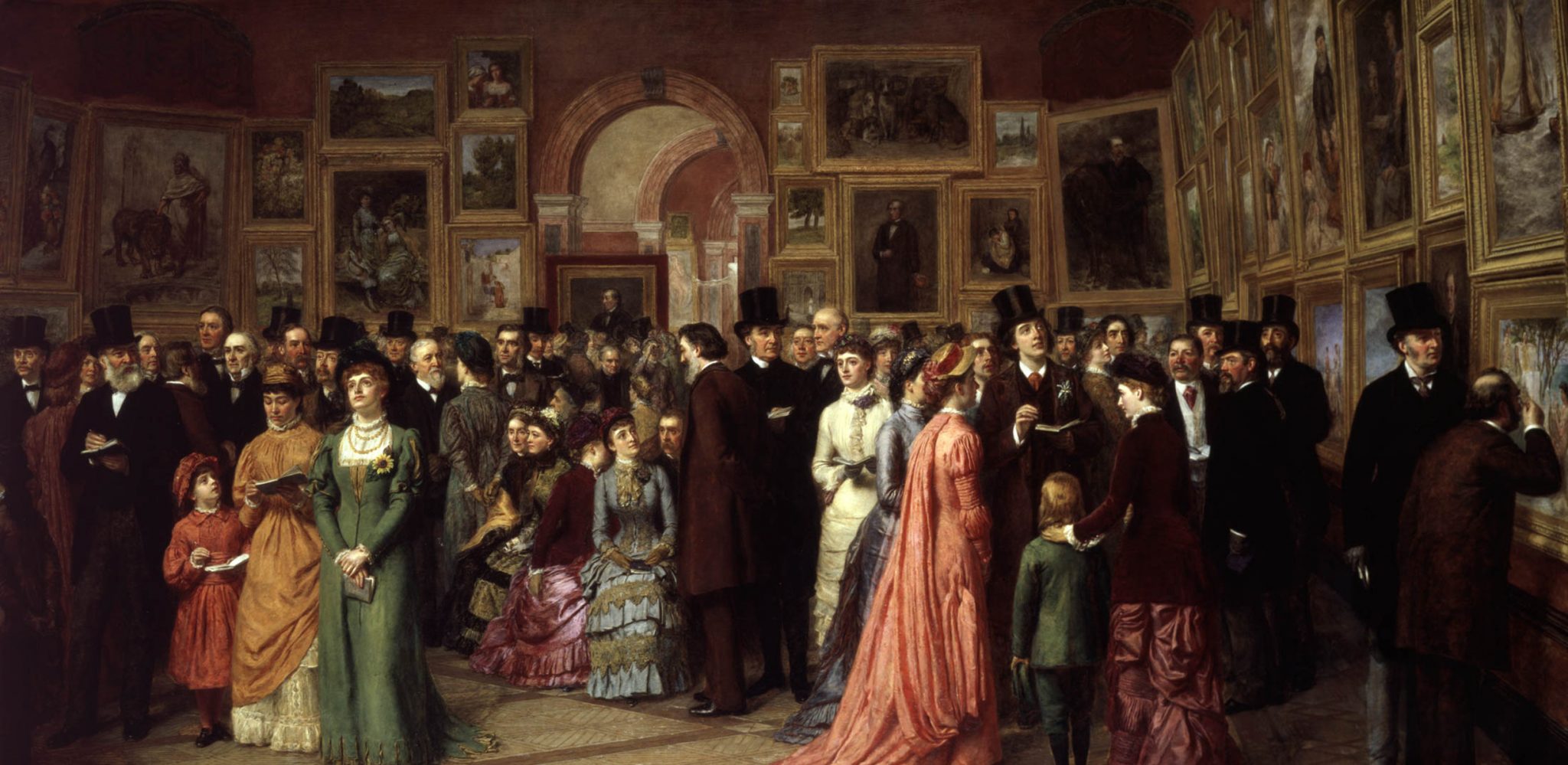From 1957: the art critic imagines a not-so-Platonic dialogue debating the exhibition’s merits
“Is there anything good in the Academy this year?”
“Yes. There’s a good sculpture – a standing nude combing her hair, a bit Renoir-like, full of sexual marvelling – by Sidney Harpley. And there’s an Italian landscape by Henry Inlander, and the usual William Roberts making everything else round it look trivial and dilettante – how long must we wait for a Roberts retrospective, and if, garrulous as he is, he won’t agree, why can’t we form a deputation to plead with him? Then there’s a Ruszkowski of Spain. And George Chapman in his mining village who is good because he paints Bert’s garden instead of the Chelsea Flower Show; that’s to say he looks at what’s in front of him and to hell with the gold medals. And – I can’t remember any more.”
“What about Minton’s last picture?”
“Despite the Press, that’s a personal question which has little to do with art criticism. There is a new poem of Jack Lindsay’s on Dylan Thomas.
‘You were a Robin Hood of tavern thickets
Talking through a burnt-out cigarette
Taking from the rich to give the poor,
Yourself the poorest
And dodging behind the wildwood of a baffling image’.”
“No promising beginners?”
“Like Minton once was, you mean. And Lady Pamela Y. And one of the booking clerks at Paddington. And the director of the Phideas advertising agency. The promising beginner means so little. The elderly, absolutely consistent and understandably bitter master like Roberts is a far better subject for thought. If you want to add a few names to your list of runners – Peter Collis, Katherine Fryer, Lewin Bassingthwaite. But if you think of their distance from Wilkie – not to take one of the very greatest – they’re no more beginners than A.K. Lawrence, R.A., William Dring, R.A. and James Gunn, A.R.A.” .
“Your own bitterness strikes me as a bit old fashioned.”
“It isn’t bitterness. It’s weariness. The weariness of being in the false position of having to treat the Academy every year as a serious art exhibition.”
“But a whole bunch of painters that you’ve championed now show there. Greaves, Middleditch, Inlander, Alfred Daniels.”
“So much the worse for them, I’m afraid.”
“And the good Academicians who fight to get such painters included – Carel Weight, Fitton, Spear, Vivian Pitchforth?”
“I respect their fight but it’s a losing battle. If they stopped fighting the Academy would become a complete and obvious irrelevance. A ludicrous farce instead of a subtle one.”
“It still draws crowds and sells well.”
“So does Selfridges at Christmas-time.”
“You’re unreasonable. How many really good works do you think it’s sensible to expect to find out of the fantastic total of 1,500? Surely not more than twenty anyway?”
“That’s the whole point. How can you possibly go on treating fourteen galleries chock a-block with works, seriously – if you know you’re only looking for twenty? The question you should ask is not ‘What’s good?’ but ‘How are the bad bad?’ There are different kinds of badness. Some are supportable and some not. Clumsy works: works of devoted energy which lack imagination: experimental works that don’t come off: a separate declared section of works by amateurs – no one could rightly object to these, but there are certain types of badness, certain attitudes which are fundamentally opposed to art and which destroy creativity and taste – saccharine sentimentality, brewer’s advertisement pornography, prestige formalism – the Royal and the High Court and the Church and the Industrial-Captain portraits are as formalist in their own way as any fifth-rate copies of Miro. Look at what most of the works are trying to do. They’re trying to titillate, lull, snobify, console, deceive, and in every way possible take for a dishonest ride –”
“Stop. You’re flogging a dead horse – the taste of the bourgeoisie. You don’t like the Academy crowds. But by your own standards I don’t see how you can like the smaller crowds at the Tate any better.”
“The horse isn’t so dead. And the crowds at the Tate may have no better values – as a whole – than those at the Academy. But there’s a difference: Van Gogh, or Matisse or Mondrian didn’t paint to please that public. Most of the artists at Burlington House do – either consciously or unconsciously. Only the most severe works of art can be independent of their context. That is why the iconoclasm of rioting crowds is not so barbaric as is often thought. Even the truthful pictures at the Academy suffer from the suspicion sown by so many of the surrounding lies.”
“You’re a hopeless romantic, dreaming of rioting crowds when what we’ve got are gaping and happy and gossiping ones. And you believe that only your truth is the truth.”
“I am not. Look. The question is simple. I admit there are always a few good works in the show. I admit there are a number of Academicians who are also artists. My point is that they are inevitably an ineffective counterbalance. They only create the illusion that the scales are just. The six wisest men in the world would, in effect, only be talking nonsense in the Tower of Babel. Admit it.”
“I do not. Gradually a few might begin to listen to them. And what is the alternative? To leave the Tower and take your precious soul out into the desert.”
“If everything outside the Academy is a desert, it must be pretty densely populated by now.”
“Why not bring everyone worthwhile inside, then? –”
The argument is endless – and annual.
First published as ‘Not So Platonic Dialogue’ in Art News and Review, Vol. IX. No. 12, 6 July 1957
